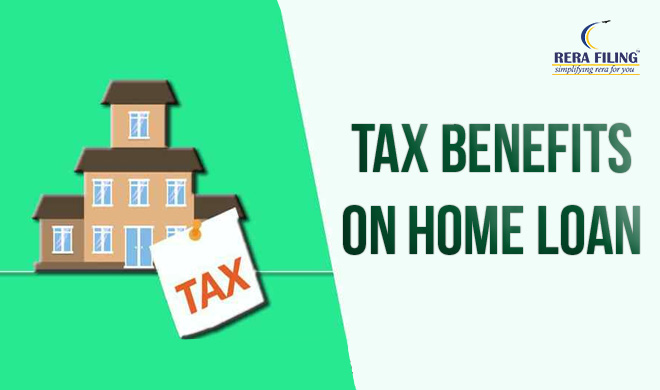Tax Benefits on Home Loan

- Thursday 25th April 2019
- Author: Shreya Uppal
Highlights
If the property is given on rent, one can claim any actual amount spent as interest , whether it is completed or not, no upper limit is there for let out property.
Taking a home loan can help an individual to save tax as per the provisions of Income Tax Act, 1961.
Section 80EE of the Income Tax Act, 1961 allows to claim deduction for first time home buyers for maximum upto Rs. 50000. To claim this deduction, the amount of loan should be upto Rs. 35 lakhs and the value of the property does not exceed Rs. 50 lakhs
Buying your own home is a Dream come true for everyone. The Indian Government has always shown a great inclination to encourage citizens to invest in house. Taking a home loan can help an individual to save tax as per the provisions of Income Tax Act, 1961. Take a look at how you can make most of these benefits:
1. Deduction for Interest paid on Housing Loan
A home loan must be taken for the purchase/ construction of a house and the construction must be completed within 5 years from the end of the financial year in which loan was taken.
An EMI has two components- Interest payment and Principal Repayment. The interest portion can be claimed as a deduction from the total income upto a maximum of Rs. 2 lakh(for self-occupied property) under section 24 of the Income Tax Act, 1961. But if its completion exceeds the time period of 5 years, then deduction allowed is upto Rs.30000. If the property is given on rent, one can claim any actual amount spent as interest , whether it is completed or not, no upper limit is there for let out property. This deduction can be claimed from the year in which the construction of the house is completed.
2. Deduction in respect of Principal Repayment
The principal repayment is allowed as a deduction under section 80C. The maximum amount that can be claimed as a deduction is Rs. 1.50 Lakhs subject to the condition that the property must not be sold within 5 years of possession. Otherwise, deduction claimed shall be added back to the total income in the year of the sale.
3. Deduction for Stamp Duty and Registration Charges
The deduction of stamp duty and registration charges can also be claimed under section 80C but within the overall limit of Rs. 1.5 lakhs. However, it can be claimed only in the year in which these expenses are incurred.
4. Deduction for First Time Home Buyers
Section 80EE of the Income Tax Act, 1961 allows to claim deduction for first time home buyers for maximum upto Rs. 50000. To claim this deduction, the amount of loan should be upto Rs. 35 lakhs and the value of the property does not exceed Rs. 50 lakhs
On the date of sanction of loan, individual must not own any other house. The loan must have been sanctioned 1st April, 2016 and 31st March, 2017.
5. Deduction for Joint Home Loan
Loan taken jointly with your family can help you claim larger tax benefits. If the loan is taken jointly , then each of the loan holder can claim a deduction of home loan interest upto Rs. 2 lakhs each and principal repayment u/s 80C upto Rs. 1.5 lakhs each in their individual tax returns. To claim this deduction, loan holder should be the co-owner of the property.
6. Tax benefits of Owning a Second Property
(a) As per the current provisions, if an individual has more than one self-occupied property, then only one of them will be accepted as self-occupied. For the other property, he will have to pay tax on the basis of notional rent. He can choose either of your properties as the self-occupied one to maximise tax benefits
(b) As per the Finance Budget announced in February 2019, it was proposed that the second self-occupied home can also be claimed as a self-occupied one instead of it being deemed to be let out on rent. This will prevent the incidence of paying tax based on notional rent, helping the owner save money. It will also help you claim tax deductions for the second property as well.
More Articles
- Online Listing Tips for Real Estate Agents
- How to start a Real Estate business in India - a complete guide !
- Renting Vs Buying property - How will you decide?
- What you should do in Property Management services
- Home Loan Insurance
- How to choose your builder?
- How to ensure fire safety in your home!
- Tips To Keep In Mind While Taking A Home On Rent
- Importance of Home Security
- How to plan your property budget?
- Leased vs. Purchased vs. Co-Working Office Spaces
- Easy Tips to Build an Eco Friendly Home
- Sample Flat - A Trick by a Builder?
- How to have a Beautiful Guest Room? Impress your Guests with these Guest Room Ideas..
- Understanding MCLR and its Effects on Home Loans
- 5 simple ways to close a real estate deal
- Is it worth to buy property near an airport ?
- Home loan tax benefit
- How to be successful in business as an introvert
- Cost effective home decor ideas
- What to Be-Paying Guest or a Tenant??
- Complete guide to start your small business
- Sports township- New trend in India
- Online Listing Tips for Real Estate Agents
- Understanding Floor Area Ratio- FAR
- Town and Country Planning | Meaning and Importance
- Checklist of Important Property Documents- All You Need to Know
- Role of CREDAI in real estate
Copyright © 2024 RERA Filing. All rights reserved.
 Rera
Act
Rera
Act
 Maharashtra
Maharashtra Karnataka
Karnataka Telangana
Telangana Andhra Pradesh
Andhra Pradesh Delhi
Delhi Uttar Pradesh
Uttar Pradesh Haryana
Haryana Gujarat
Gujarat Bihar
Bihar